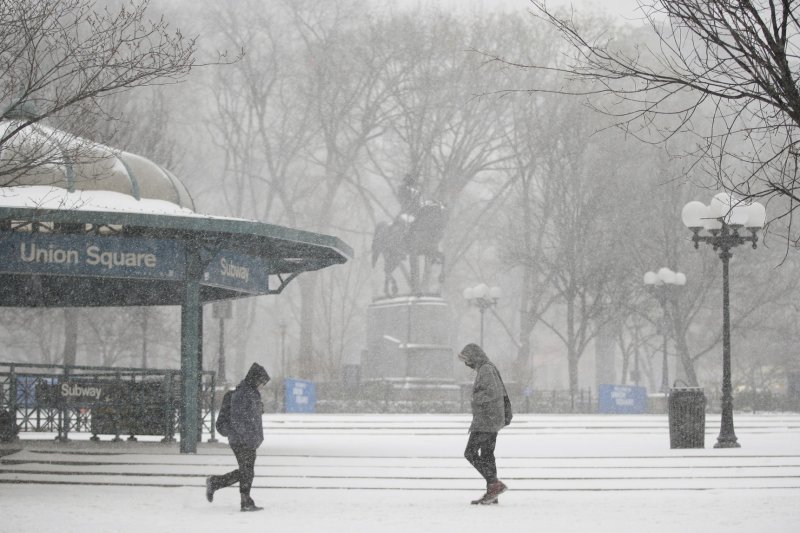1 of 11 | Pedestrians bundled up for cold weather walk in Union Square in below freezing temperatures in New York City on Thursday. Photo by John Angelillo/UPI |
License Photo
Jan. 4 (UPI) -- A powerful winter storm meteorologists are describing as a "bomb cyclone" caused the Atlantic Ocean to breach the seawall in Scituate, Mass., causing tidal flooding and forcing residents to evacuate Thursday.
Officials opened Scituate High School as an emergency shelter for residents as snow also pummels the region.
"We want people to stay away from here," Town Administrator Jim Boudreau said. "This seems to be a spectator sport at times, people like to come down and look at the ocean, but again when those waves start coming and hit that sea ice, they're going to send pieces of that ice flying."
Hurricane-strength winds pushed the ocean tides higher than normal, flooding other coastal communities, including Marshfield and in Hampton Beach, N.H. The Boston Globe reported the tide was nearing its highest recorded level in Boston.
Flooding closed the Massachusetts Bay Transportation Authority's Aquarium Station as well as McClellan Highway in East Boston. Snow accumulations totaled 9.5 inches in Dighton and up to 18 inches were expected in some areas of the state.
The National Weather Service predicted snow would accumulate 1 to 3 inches per hour throughout the day. Conditions were expected to improve after 5 p.m. Boston schools were closed Thursday and Friday.
Gusts of 75 mph were recorded in Wellfleet, Mass., and a gust of 76 mph was recorded in Nantucket. Hurricane-force winds are those equal to or stronger than 74 mph.
Massachusetts Gov. Charlie Baker warned residents of the dangerous conditions to come.
"The snow is expected to fall extremely quickly once the system starts to move ... I promise you ... across most of Massachusetts it's going to look pretty rough out there,'' Baker said. "You don't hear the weather people use the word blizzard or whiteout that often, and they are using that term quite often."
As the storm moved north, Blizzard warnings were issued for more than 8 million residents along the Eastern Seaboard, and nearly 44,000 were without power.
Thirteen states from South Carolina to Maine are under a winter storm warning as a massive bombogenesis area of rapidly declining low pressure will cause a "bomb cyclone."
A bomb cyclone can blast the air with icy temperatures as it draws colder air from the north.
More than 4,000 flights were canceled with John F. Kennedy International Airport suspending flights around 11 a.m.
More than 70 percent of Newark's flights and 90 percent of New York's LaGuardia flights were also canceled.
"The issue impacting operations at the moment is the ability to plow snow fast enough," said Sara Orsi, senior marking manager for FlightAware. "As the storm moves through, de-icing capacity will be a greater concern and will limit operations at airports along the East Coast."
Islip, N.Y., accumulated 13 inches of snow at the rate of 2 inches to 3 inches per hour, and wind gusts reached 50 mph at John F. Kennedy International Airport in New York City.
New York Gov. Andrew Cuomo declared a state of emergency for the city, which could receive up to 10 inches of snow.
"Snow is one thing. We can handle snow. It's snow plus the wind which is going to cause the trouble today," he said. "The situation is going to get worse as the day goes on."
New York City Mayor Bill de Blasio said a winter weather emergency would allow city agencies to "take additional actions to keep us safe." He urged residents to stay off the road and said that all vehicles on roads would be towed.
The mayor said that though schools were closed Thursday, they were expected to be open Friday.
Earlier in the week, winter weather brought unusually cold temperatures and snowfall to southern states, as far as Florida.
About one-tenth of an inch of snow fell on Tallahassee, Fla., on Wednesday -- the first measurable snowfall there since 1989. Nearly a quarter-inch of ice was measured in Lake City, Fla.
Ellabell, Ga., saw 6 inches of snow. South Carolina saw its third heaviest snowfall in one day on record in Charleston, where 5.3 inches of snow was measured Wednesday.
This week, 12 people have died in cold-related deaths nationwide.















